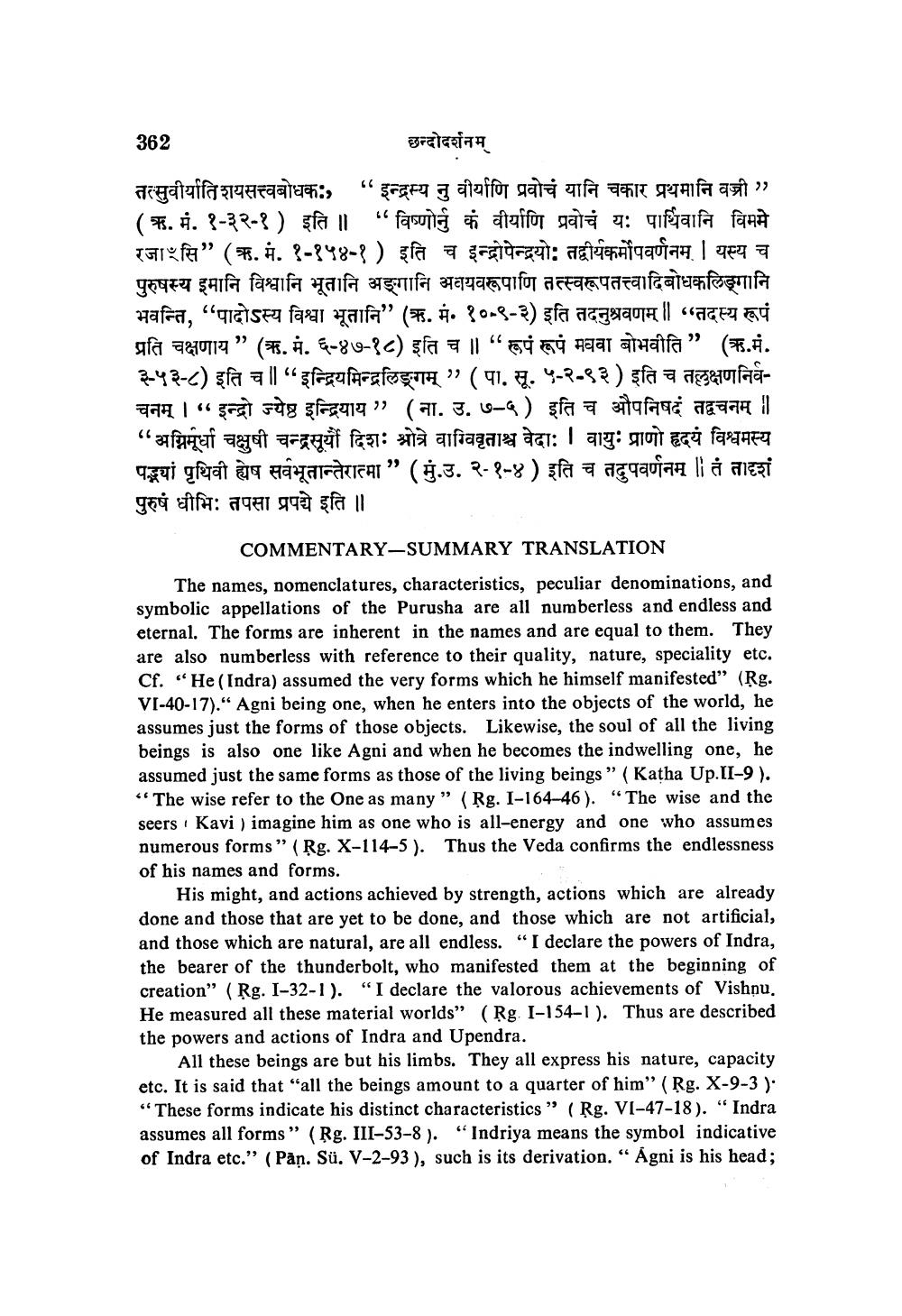________________
छन्दोदर्शनम्
८८
99
तत्सुवीर्यातिशयसत्त्वबोधकः, इन्द्रस्य नु वीर्याणि प्रवोचं यानि चकार प्रथमानि वज्री " (ऋ. मं. १-३२- १ ) इति ॥ 'विष्णोर्नु कं वीर्याणि प्रवोचं यः पार्थिवानि विममे रजा सि” (ऋ. मं. १ - १५४ - १ ) इति च इन्द्रोपेन्द्रयोः तद्वीर्यकर्मोपवर्णनम् | यस्य च पुरुषस्य इमानि विश्वानि भूतानि अङ्गानि अवयवरूपाणि तत्स्वरूपतत्त्वादिबोधकलिङ्गानि भवन्ति, “पादोऽस्य विश्वा भूतानि” (ऋ. मं. १००९ - ३) इति तदनुश्रवणम् || “ तदस्य रूपं प्रति चक्षणाय (ऋ. मं. ६-४७-१८) इति च ॥ " रूपं रूपं मघवा बोभवीति " (ऋ.मं. ३-५३-८) इति च |" इन्द्रियमिन्द्रलिङ्गम् " ( पा. सू. ५-२-९३ ) इति च तल्लक्षण निर्वचनम् | " इन्द्रो ज्येष्ठ इन्द्रियाय " ( ना. उ. ७ - ५ ) इति च औपनिषदं तद्वचनम् || "अग्निमूर्धा चक्षुषी चन्द्रसूर्यौ दिशः श्रोत्रे वाग्विवृताश्च वेदा: । वायुः प्राणो हृदयं विश्वमस्य पद्भ्यां पृथिवी ह्येष सर्वभूतान्तरात्मा ” ( मुं. उ. २-१-४ ) इति च तदुपवर्णनम् || तं तादृशं पुरुषं धीभिः तपसा प्रपद्ये इति ॥
362
((
COMMENTARY-SUMMARY TRANSLATION
The names, nomenclatures, characteristics, peculiar denominations, and symbolic appellations of the Purusha are all numberless and endless and eternal. The forms are inherent in the names and are equal to them. They are also numberless with reference to their quality, nature, speciality etc. Cf. "He (Indra) assumed the very forms which he himself manifested" (Rg. VI- 40-17). "Agni being one, when he enters into the objects of the world, he assumes just the forms of those objects. Likewise, the soul of all the living beings is also one like Agni and when he becomes the indwelling one, he assumed just the same forms as those of the living beings ” ( Katha Up.II-9 ). "The wise refer to the One as many" (Rg. I-164-46). "The wise and the seers Kavi) imagine him as one who is all-energy and one who assumes numerous forms" (Rg. X-114-5). Thus the Veda confirms the endlessness of his names and forms.
His might, and actions achieved by strength, actions which are already done and those that are yet to be done, and those which are not artificial, and those which are natural, are all endless. “I declare the powers of Indra, the bearer of the thunderbolt, who manifested them at the beginning of creation” ( Rg. I - 32-1). "I declare the valorous achievements of Vishnu. He measured all these material worlds" (Rg I-154-1). Thus are described the powers and actions of Indra and Upendra.
All these beings are but his limbs. They all express his nature, capacity etc. It is said that "all the beings amount to a quarter of him" (Rg. X-9-3 ). “ These forms indicate his distinct characteristics " ( Rg. VI- 47-18). "Indra assumes all forms" ( Rg. III-53-8 ). "Indriya means the symbol indicative of Indra etc." (Pan. Sü. V-2-93), such is its derivation. "Agni is his head;




